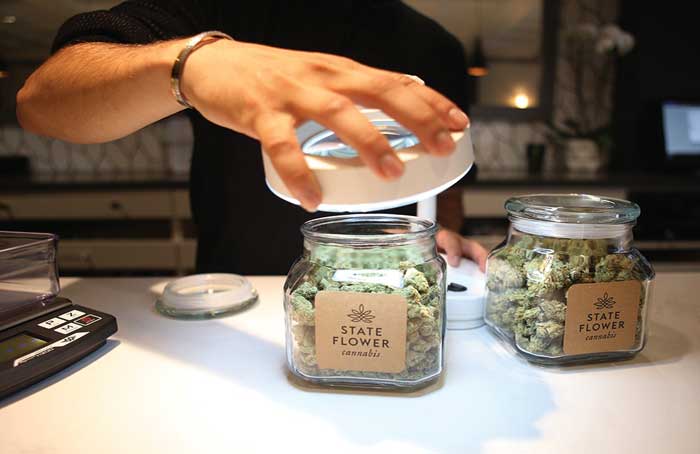A third-party contract to produce the state’s medical marijuana identification cards was awarded to a company in Jacksonville this week following a noticeable influx of registered patients over the past eight months.
State Surgeon General Celeste Philip announced in a memo last week the immediate award of a pending contract to produce Medical Marijuana Use Registry (MMUR) identification cards. On Monday, the Florida Department of Health signed a five-year contract worth $7.9 million with Jacksonville-based Veritec Solutions, LLC.
“In order to ensure timely access to medical marijuana for patients currently suffering from qualifying medical conditions, it is necessary to make an immediate award of a contract to produce identification cards for patients and caregivers under DOH16-071,” Philip said in the memo.
Philip noted in the subject line of her memo that the decision was made in an effort to “avoid an immediate and serious danger to public health.”
As of Nov. 8, there were 50,775 registered patients in the State of Florida. The Office of Medical Marijuana Use (OMMU) has printed just over 29,000 cards, according to Philip. Lawmakers and patients alike have recently complained about the sluggish application process, which is required to be completed before a prescription can be filled at a licensed dispensary.
According to Philip, the OMMU has experienced an exponential growth of patients getting registered for medicinal cannabis over the past eight months. The department is currently seeing an average of 264 new patients added to the registry each day, a sharp increase from the 90 that were being registered daily back in March.
“The OMMU expects that the number of applications in the Office’s queue will exceed the OMMU’s capacity to timely process applications and print cards when the number of patients added to the MMUR reaches 350 per day,” Philip said.
That level of patient registration is expected to be seen by the department within the next 30 to 60 days, according to Philip, at which point the wait time for card applicants could reach or extend past 90 days. Philip said the FDOH expects there to be anywhere between 300,000 and 500,000 patients registered within the next two years.
There are approximately 4,200 completed card applications and 1,000 incomplete applications that are currently being processed by OMMU staff, according to Philip. Of the 35 employees on the payroll, 27 of them are fully devoted to processing card applications and answering phone calls regarding the application process. The contract with Veritec will effectively alleviate those tasks.
“The card application program is extremely resource intensive and further continued diversion of OMMU personnel to serve the needs of the card program will negatively impact OMMU’s core regulatory functions,” Philip said.
Section 381.986 of Florida Statutes directs the FDOH to contract services with a third-party vendor that has “experience performing similar functions for other state agencies.” A bidding process to determine the winner of the contract was initiated through an Invitation to Negotiate (ITN) issued by the department in August.
A total of 10 vendors responded to the ITN and three were chosen for negotiation. It was announced on Oct. 23 that the department intended to award the third-party contract to Veritec Solutions, despite the company receiving the lowest score on cost proposals and technical replies of the three.
Automated Health Systems, Inc. filed a notice of intent to protest the department’s decision on Oct. 25, followed by a formal written protest and petition for formal administrative hearing on Nov. 3. The petition was referred to the Division of Administrative Hearings on Nov. 20, the same day the contract with Veritec was signed.
“The rate of growth of this program has proven that we cannot wait for an ITN protest without impacting patients currently suffering from qualifying medical conditions,” said Mara Gambineri, FDOH communications director.
The formal written protest claims as a statement of ultimate fact that “AHS’s reply was in full compliance with all mandatory requirements of the ITN, was the top ranked reply submitted to DOH in response to the ITN, and in all respects provides the best value to the State.”
The grievance was short-lived, however, as Automated Health Systems filed a notice of voluntary dismissal of its petition for an administrative hearing on Tuesday.
Veritec’s website claims the company has 13 years of experience in implementing and managing regulatory systems. Industries the company is involved in include payday lending, auto-title lending, medical marijuana, check cashing database solutions and anti-predatory mortgage database.
“Veritec is pleased to partner with Florida’s Office of Medical Marijuana Use to facilitate timely issuance of patient and caregiver identification cards that they desperately need,” said Jaymie Kohl, Veritec spokesperson and marketing coordinator for Intuition, LLC. “We look forward to working with the Office to efficiently and effectively enable timely access to this important program for patients with qualifying medical conditions.”
Veritec Solutions is a subsidiary of Intuition, LLC, a private company headquartered in Jacksonville. The company was founded as Intuition Systems, Inc. in 1991.
A template used by Veritec in the production of medical marijuana identification cards issued in the State of California can be viewed on the company’s website.
The $7.9 million contract the state has signed with Veritec will be paid out over the course of five years. Fixed fee payments averaging $90,474 per month will be paid to Veritec for the life of the contract. In addition, Veritec will collect $4.19 per registry identification card for the first 199,999 cards produced annually.
“These patients are suffering from conditions that include cancer, epilepsy, chronic nonmalignant pain and possibly terminal conditions, where time is of the essence,” Philip said. “Moving forward with a vendor will also allow the OMMU staff to concentrate on their core functions in facilitating patient access, regulating Medical Marijuana Treatment Centers, working with physicians, and supporting the regulatory framework to ensure safe access to medical marijuana in Florida.
credit:firstcoastnews.com


